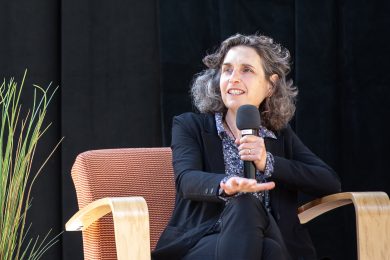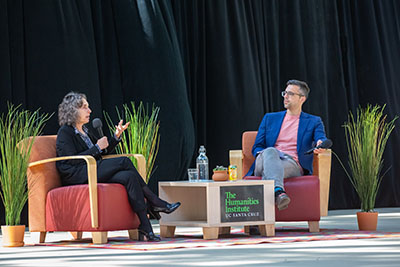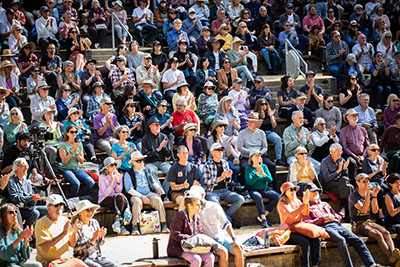Pulitzer Prize-winning climate journalist Elizabeth Kolbert warns of the complications, perils, and potentials of environmental interventions at Deep Read talk on campus
Kolbert’s talk, the culminating event of this year’s fourth annual Deep Read initiative, served as a strong and sobering corrective to environmental hubris.

Pulitzer Prize-winning climate journalist and bestselling author Elizabeth Kolbert offered no simplistic solutions to the climate crisis during her on-stage discussion with New York Times columnist, podcaster and UCSC alumnus Ezra Klein this weekend at the Quarry Amphitheater.
If anything, Kolbert’s talk, the culminating event of this year’s fourth annual Deep Read initiative – an annual program of The Humanities Institute at UCSC – served as a strong and sobering corrective to anyone who over-promised about remedies ranging from “electrified rivers” to the use of invasive creatures such as cane toads and Asian carp to solve environmental crises without the use of pesticides that harm wildlife.
Instead of providing empty platitudes, Kolbert, author of Under A White Sky: The Nature Of The Future, encouraged the crowd at the Quarry Amphitheater to work for solutions with a combination of wisdom and humility while considering the unintended consequences of even the most well-intentioned efforts to address climate change.
Under A White Sky, in Kolbert’s words, is “about people trying to solve problems created by people trying to solve problems.”

Much of the book hinges on the stories of scientists who believe they have no choice but meddle in nature to reverse the unforeseen consequences of previous meddling.
The trouble is that this counter-meddling, no matter how complex, far-ranging and expensive, can create even more problems that demand more remedies, creating an endless cycle of accidental harm and harm abatement.
And yet, as Kolbert states in her book, many of the people she interviews also believe that doing nothing can also have a devastating impact. Many of the scientists in Under A White Sky believe the world has been altered to the point where humans have no choice but try to manage the catastrophe they’ve created.
The book gets its title from an emerging technology called solar geoengineering, a highly controversial proposed method of cooling the planet and reflecting the sun’s rays by seeding sulfate particles into the stratosphere, a method that could turn the skies from blue to white in the process.

Kolbert and Klein also discussed the delicate issue of stakeholder engagement in regard to the use of solar geoengineering. Who should be included in conversations regarding the wisdom of using it? This is an issue that UCSC associate professor of environmental studies Sikina Jinna, an environmental governance expert, has studied in detail, while calling for a “broad and inclusive process” for planetary decision-making.
One of Under A White Sky’s most memorable passages comes from Andy Parker, project director of the Solar Radiation Management Initiative, who says, “We live in a world, where deliberately dimming the (expletive) sun might be less risky than not doing it.” Klein told Kolbert that “this is one of my favorite quotes of all time.” Whether or not the audience agreed that solar geoengineering is a good idea, Parker’s quote speaks to the hubris and foolishness of the human race and the mess it is in, Klein said.
At times the book is darkly comic in the way it delves into strange and counterintuitive solutions to climate catastrophe. But the book is also full of stories about people who are passionate about their work and sincere in their efforts to solve intractable problems.
Considering the fate of coral reefs
Kolbert said the writing and research of this book began when she went to Hawaii and spoke with marine biologist Ruth Gates, widely recognized for her research into increasing the resilience of coral reefs.
Gates, who died suddenly in 2018, focused on developing “super corals” that could resist bleaching and other environmental impacts.
“Her words set me on this whole journey, and I often think about them,” Kolbert said. “At the time, super corals were very controversial – this idea that we screwed up the ocean so much that we have to intervene if we want reefs. A lot of people said, you weren’t getting reefs back if you had to manipulate them. Reefs are just huge. They are whole ecosystems. But her point was, we don’t have any choice, we are in this too far. I don’t know if she had the answer but she asked an important question.”
Klein asked Kolbert about humanity’s tendency to categorize itself apart from nature at a time when the boundaries between ‘natural’ and human processes and impacts are blurred. In response, Kolbert said that human beings diverged from the rest of the natural realm when it began to use technologies that could change entire landscapes, including weapons.
Even in ancient times, peoples hunted animals to extinction, Kolbert said. Humans are also prime drivers of ‘speciation,’ the practice of moving species all across the earth, including rats.
She also talked about the complications of solutions that may seem natural but have enormous consequences of their own. “I don’t know if we can get out of that cycle,” she said. “Think of all the mining we have to do for electric cars, all the rare-earth minerals.”
The Deep Read: forming a community of readers
Under A White Sky is the first-ever creative nonfiction selection in UCSC’s Deep Read program. The selection of this bestselling book led to an outpouring of interest. More than 1,200 people registered in advance for this year’s Quarry Amphitheater talk, the highest number for any Deep Read keynote talk in the event’s four-year history.
The Deep Read activities included regular weekly emails that unpacked different aspects of the book with the guidance of visiting associate professor of journalism Jody Biehl, professor of environmental studies Sikina Jinnah, professor of marine sciences Mike Beck, who directs the new Center For Coastal Climate Resilience, and assistant professor of environmental art Jorgge Menna Barreto.
There were online forums to ask questions and connect with fellow Deep Readers, and a salon in which participating professors led discussions with UCSC students and other members of the Deep Read community joining either virtually or in person.
The selection of the book led to discussions about deep ecology, responsibility to future generations, and stewardship of the planet, as well as the role of the humanities in addressing humankind’s most pressing problems including climate change.
“As Elizabeth Kolbert’s Under a White Sky makes clear, we will need more than scientific and technological solutionism to tackle climate change and build a just future,” UCSC Dean of the Humanities Jasmine Alinder said. “We also need contributions from the humanities and the arts, which are essential to any such future, or really any future at all.”
“Deeply complex, seemingly intractable problems need interdisciplinary, innovative approaches,” Alinder said. “There are ideas that can only be conceived of and conveyed through the humanities – questions, debates, and conversations about what it means to be human, to be alive, to work to transform society for the better.”
Engaging the audience
The Deep Read is a public-facing event, giving the community a chance to delve deeply into books and engage the authors directly during the culminating live presentation.
Last weekend, the amphitheater full of Deep Readers lived up to their name, asking questions that showed their deep engagement with the text.
They pressed Kolbert and Klein about the role of capitalism in creating and worsening the climate crisis, and the importance of turning to indigenous peoples for climate solutions.
One audience member mentioned the carbon imprint that Kolbert and Klein had made just by flying to California for their Deep Read presentation. Kolbert and Klein both acknowledged that this was a conundrum.
Asked if she had any reason for hopefulness about the climate future, Kolbert made a cautious, measured observation that left at least some room for optimism.
“I guess I do believe, at the end of the day, as a humanities major, that we are capable of thinking things through, that there is a capacity of knowledge, and the more we can imagine different ways of living, the better off we’ll be,” she said.
“Humans are unbelievably multifaceted, and maybe that is the most hopeful thing I can say,” Kolbert told Klein. “Humans are capable of intense love, intense self-sacrifice, intense greed, and intense destruction. All of these are true simultaneously. Every single day, we are making choices about which of these elements will prevail. That’s what makes my job interesting. That’s what makes life interesting. And that’s what makes it beautiful and terrifying.”
The Deep Read Program is made possible through the generous support of the Helen and Will Webster Foundation.
Original Link: https://news.ucsc.edu/2023/05/kolbert-quarry-klein-feature-dw.html
